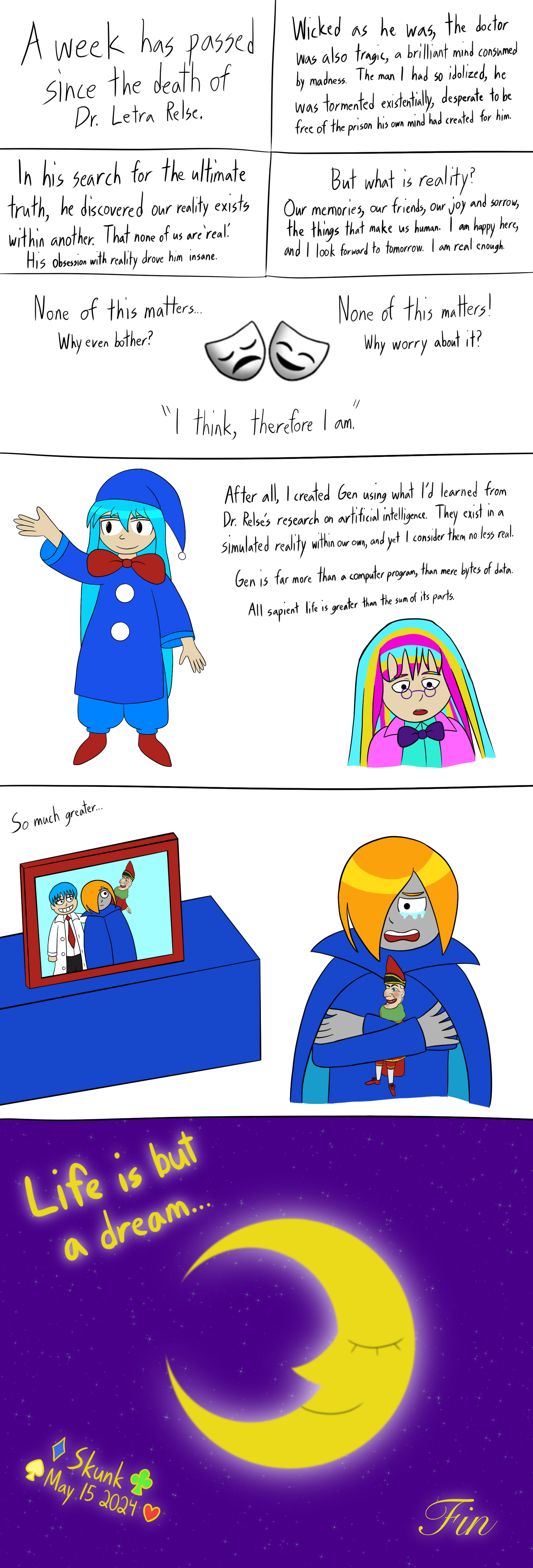HOME | DD
 SkunkStarlight — Peril of the Puppet Master (Part IV)
SkunkStarlight — Peril of the Puppet Master (Part IV)

#comic
Published: 2024-05-15 09:20:36 +0000 UTC; Views: 1306; Favourites: 7; Downloads: 0
Redirect to original
Description
Previous | NextThe Departure of Dr. Letra Relse was the very first comic I made after joining DeviantArt back in 2018, as well as the second drawing I'd made, having gotten back into learning to draw only a few days prior. I'd intended to follow up on that comic and tell this story a long time ago, with the script collecting digital dust in my writing folder for more than half a decade now, but my skills were never "good enough".
Even now, I didn't feel at all confident, but I decided "to hell with it" and went and did it anyway. It doesn't have the fancy backgrounds and poses I imagined, it's been abridged, and many of the panels were loosely drawn, uncolored, and reused portraits, but I've finally told this story, and after six years of saying "I plan to make comics once I get better at drawing", I've at long last created my first multi-part comic since joining DeviantArt.
Letra, Nautilus, and Platypus are some of my older characters, having appeared in the original Silver Stars, though not until around the late 90's. Canonically, Dr. Relse is also one of the oldest characters in the series, having been born when the old gods were still young, and before any of the new gods had appeared in Galmiun. Platypus was one of the first new gods, though even he didn't come into being until after Dr. Relse had already left for the stars.
As for Nautilus, he wasn't the first of Letra's creations, though he was a prototype for his final series of synthetically created humans, the Aquatic Automatons. Forged from metallic alloy and undergoing an advanced "organicizing" process, the result was not unlike the tales of man being molded from clay, as Nautilus' organic body, unusual skin tone aside, is far more human than machine. The doctor had successfully created a divine being, one just like the old gods, on his first attempt. So successful was this attempt that he would never surpass it, even with Nautilus' imperfections.
At first, Nautilus behaved robotically and expressed no emotion. He remained as such for a long time, and loyally served his master. The doctor had used him as a weapon to conquer galaxy after galaxy, but Nautilus gradually began to awaken, becoming increasingly self-aware and developing a personality and feelings. During the battle against the Zodiacal Gods and the Insectoid Demons, it became clear to Nautilus that his own creator needed to be stopped.
Many of the villains in my series are completely immortal and cannot be permanently destroyed. They are blessed with divinity by the elder gods, and their souls are indestructible. Letra rejected this form of everlasting life, believing he would be a puppet of the elder gods, and would accept nothing less than being above all things, beholden to nothing but himself. Unlike divine beings who are everlasting and mortals who's souls return to the aether before eventually being reborn as a new person, the doctor transformed himself into an incomprehensible cosmic horror, and his essence has been fully erased. Nothing in this reality, not wish magic nor elder gods, can ever bring him back. He's one of the very few major villains in my series who truly dies.
He's also my most philosophical villain. Even when he's not physically present, as is the case throughout most of the series, he raises questions about life, reality, dreams, consciousness, sonder, and what it means to exist. Hopefully this story didn't come across as too pretentious. I used to ponder these things very often when I was younger, back when I created these characters, and when my obsession with things like The Matrix, Through the Looking-Glass, Link's Awakening, NiGHTS into Dreams, Klonoa, and Kirby was at its peak.
My own philosophy is much like that of Platypus. If in the future we have artificial intelligence indistinguishable from humans, I would consider them real. My own characters are a part of me, a part of my consciousness, and therefore they are as real to me as my consciousness is. If I mention a character like Lewis Carroll's Alice, and we both imagine the same world and characters, does that not make it, at least on some level, real? Our creations take on a life of their own, and provide a lasting impact even long after we're gone. One could argue that they are more real than we ourselves are.
I feel we as humans often dwell on things like the meaning of life, and treat fiction as less meaningful because it isn't 'real'. Yet, our lives have no more meaning than what we give them, what we create from our imaginations, while that which we create from our imaginations is what gives this all meaning. Life without art, without imagination, without fiction, is just survival.
You gaze up at the moon and the stars, and what do you feel? You often feel like the main character of your own story, and yet the humbling effect of the cosmos reminds you that you're just one little star twinkling in the night sky. Under the moonlight are countless others, pondering the very same things as you. Are they as real as you? Are any of us real? Why are we here? The moon provides no answers, only a comforting glow, though perhaps that is the answer. No matter how it happened, we're all here together, so let us all be a comforting glow to guide each other through the darkness.

























